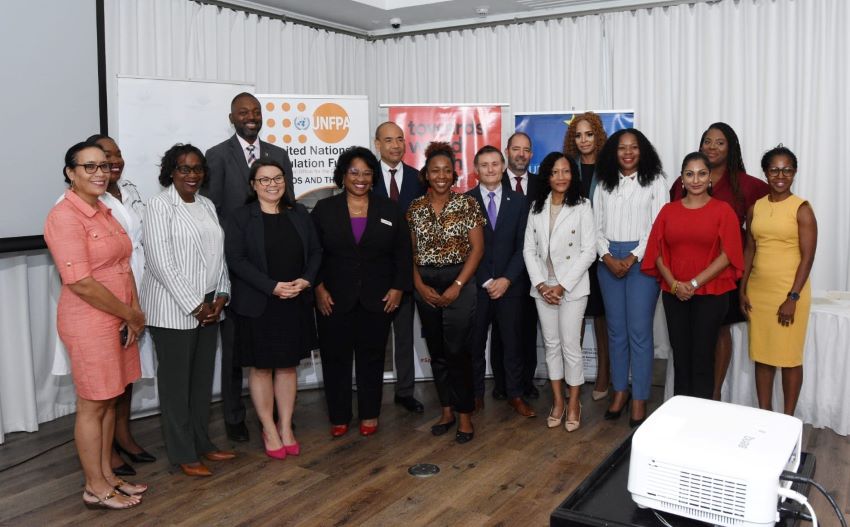
Another progressive step towards addressing violence and harassment in the world of work was taken on Wednesday with the launch of the Gender-Based Violence (GBV) Workplace Policy Implementation Spotlight Project.
The launch ceremony, at Ocean 2 Beach Club and Spa, Christ Church, saw the signing of a declaration by eight local and regional companies that will aid Phase 2 of the project being undertaken by the Caribbean Employers Confederation (CEC), through funding from The United Nations Population Fund (UNFPA) and the European Union (EU).
The signing of the declaration was welcomed by Minister of Labour, Social Security and Third Sector, Colin Jordan, who stressed that it represented progress. Acknowledging that Barbados was working to root out GBV because it was the right thing to do, he said: “If societies are to thrive, there must be respect for human rights. Preventing and responding to violence and harassment must be treated as a matter that addresses human rights, justice and equality.”
Minister Jordan also noted that violence and harassment in the workplace could be very impactful. “Violence and harassment in the world of work and at work … causes harm to individuals, families, businesses and to the wider society. It affects people’s lives, dignity, self-esteem health and wellbeing.
“It also worsens inequality in societies and undermines business productivity. There should be no place for and no tolerance for violence and harassment,” he stated.
Disclosing that more than one in five persons in employment had experienced violence and harassment at work, whether physical, psychological or sexual, he opined that to address the scourge effectively, it was necessary to know and recognise its prevalence.
The Labour Minister encouraged employers to use the policy as a guide to develop strong workplace policies on GBV, and to do so taking into context national laws and regulations and the nature of organisations. He further noted that employers have a moral and ethical responsibility to create a safe and inclusive workplace for all employees, and having a GBV policy demonstrates commitment and builds a positive image for companies’ willingness to address challenging issues.
Meanwhile, UN Resident Coordinator for Barbados and the Eastern Caribbean, Didier Trebucq, in expressing appreciation to Barbados and the other partners for their support and funding of the initiative, said: “As we see women and girls experiencing violence in private and public spaces, GBV has long been advocated as a public issue, and considering the amount of time we all spend in the workforce, we cannot allow the workplace to be an exception to this.
“This is why I want to commend the Barbados Government, and particularly Minister Colin Jordan, for his leadership, on the ratification last year of the ILO Convention 190 to ensure that the work place is free of violence and harassment. This is a major breakthrough for Barbados. Barbados was the second country in the Caribbean to ratify this Convention last year.”
The UN Resident Coordinator also acknowledged that working with companies to implement policies could fulfil the goal of ensuring a safe workplace for everyone. And, he added: “With the 2023 global SDG Summit less than a week away in New York, this is welcomed progress on our work to end gender-based violence in the region and achieving the SDGs for people everywhere.”
The workplace policy on GBV encompasses ILO standards and global best practices. It offers a proposed minimum standard for addressing GBV at work but also in the world of work. The development of the policy, as the first phase of the initiative, saw input provided from a wide cross-section of companies and trade unions across the region. The second phase will focus on the implementation of the policy by participating companies across the region.
